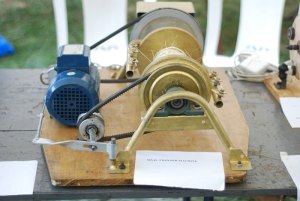
Sisal rope making machine,product of Sifa Machinery.
A new invention is helping small scale farmers produce more fibres with ease by providing them with an alternative and more effective way of processing sisal crop to fibre as opposed to the older methods of scraping which involved manual mechanical striping operation using a bladed metal bars.
Alex Odundo, who designs and assembles the decorticator, believes that traditional methods of obtaining fibres from sisals are very labor intensive and time consuming hence inefficient and unsuitable for small scale farmers keen to grow the crop for commercial processing of the fibre.
RELATED STORY: Kisumu agriprenuer reaches over 10, 000 farmers with fibre extraction machine
“Scraping is purely manual which takes more time to operate and produce less quantity and quality of fibres hence unproductive for small farmers,” said Odundo.
“Furthermore there are heavy and large motorized machines that are available and confined to major sisal plantation zones in Kenya such as Kilimambogo sisal estates, Machakos, Taita Taveta and Baringo which cannot be used by small scale farmers.”
Odundo, who is a Kisumu Polytechnic graduate, started Sifa Machinery where he operates a workshop and has since employed more than seven youths working in the workshop while five others in field. The workshop has succeeded in designing and making small portable sisal decorticating machines that is aimed at realizing sisal development especially in semi-arid areas.
Machine Varieties
They include: petrol engine machines which consume six to seven litres of petrol and has a capacity of producing 160kgs of fibre in eight hours. Majority of these machines weighs 110kg with the price ranging from Sh80, 000-110, 000.
Diesel engines with a capacity of producing 160-200kgs of fibre in 8hrs consumes four to five litres of diesel. Majority weighs 10kgs going for between Sh110, 000-150, 000. There is also a Double Head sisal decorticator with a capacity of producing 200-350kg of fibres in eight hours consuming eight to ten litres of diesel.
RELATED STORY: Banana fibre turn the tide for an entrepreneur in Kirinyaga County
At his workshop, Odundo works on the designs and helps his staff in assembling the machines. “Our machines are made as small or wide as is practical to be used by the small sisal holders whom we work with closely to pass the operations skills to,” he said.
Marketing
Odundo has so far reached over 10,000 farmers nationally with the sisal decorticator machines. This is made possible by several field tours in sisal growing areas such as South Eastern parts of Kenya, parts of; Homa Bay and Migori Counties to find farmers growing and talk to them.
He also conducts research on market price of fibres, export opportunities for fibres which form part of the selling points for his machines. “We not only sell machines to farmers, we also assist them with the market opportunities where they can sell the produce. This research work has taken me six years in building the business,” said Odundo.
RELATED STORY: Researchers: Banana pseudo stems are rich source of quality fibres
His blog, Sifa Machinery WordPress , is also key in advertising his products for interested buyers who place orders for delivery in a week time by his field employees who further help the farmers on how the machines work. Delivery cost is shared equally share between the farmer and the workshop.
This has helped him reach over 10, 000 farmers as individual farmers and groups in Kenya with over 100 decorticator machines.
Odundo is seeking to further develop machines to incorporate use of the solar power system in replacement of the fuel operated mechanisms aimed at increasing the production capacity, safety of the machine, durability and quality of the final product.
Write comment (0 Comments)

















